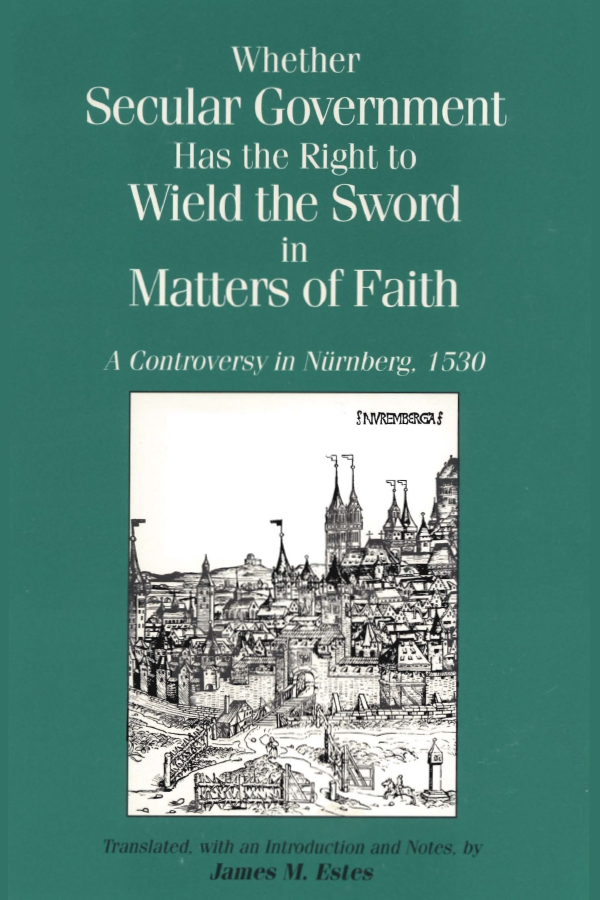Whether Secular Government Has the Right to Wield the Sword in Matters of Faith: A Controversy in Nürnberg, 1530
Translated with an introduction and notes by James M. Estes - TT06
Overview
By the beginning of the 1530s, the governments of many German territories that had abolished Catholicism and established the Reformation had begun to impose strict uniformity of doctrine and worship on their subjects. In some communities, individuals who felt threatened by the impending orthodoxy raised their voices in protest. The texts in this volume record one such protest and the responses that it evoked.
The individual making the protest was a prominent citizen of Nürnberg whose name is unknown. In the spring of 1530 he submitted to the secretary of the Nürnberg city council a skilfully argued memorandum in which he maintained that secular governments have no authority in matters of faith and must therefore tolerate Anabaptists, Jews, and any other religious dissidents whose conduct is peaceful. Since this called into question the basic assumption of the Protestant reformers and their governmental allies that the Christian magistrate has the divinely imposed obligation to establish and maintain true religion and remove error, three theologians — Andreas Osiander and Wenceslaus Linck in Nürnberg and their colleague Johannes Brenz in Schwäbisch Hall — wrote learned memoranda in response to the memorandum of the anonymous Nürnberger. While the anonymous memorandist’s arguments in favour of toleration are in striking harmony with our latter-day view of the matter, the counter-arguments of the three theologians demonstrate why the most learned and respectable people in the sixteenth century thought that religious intolerance was the solemn duty of every Christian magistrate and that toleration was wicked, inhuman, and dangerous.
James M. Estes is Professor of History at the University of Toronto and past director of the Centre for Reformation and Renaissance Studies at Victoria University in the University of Toronto.
To view an excerpt: Please click here.
118 pp.
ISBN: 978-0-9697512-4-3 softcover
Published: 1994
Contents
Introduction
The Controversy
The Content of the Documents
Translator's Note
Select Bibliography
Document Number One
Lazarus Spengler's Letter to Johannes Brenz, 26 March 1530
Document Number Two
Whether Secular Government Has the Right to Wield the Sword in Matters of Faith. Anonymous
Document Number Three
An Answer to the Memorandum That Deals with This Question:
Whether Secular Government Has the Right to Wield the Sword in Matters of Faith.
By Johannes Brenz
Document Number Four
Whether a Secular Government May Regulate Spiritual Matters, Restrain False Teaching,
and Put Down Ungodly Abuses (preceded by an introduction bearing the title: An
Admonition to Avoid Unnecessary and Vain Questions and Disputes . . .). Authorship
uncertain (Andreas Osiander or Wenceslaus Linck?)
Document Number Five
Whether Secular Christian Government Has the Power to Ban False Preachers or Erring
Sects and to Establish Order in Ecclesiastical Affairs. Authorship uncertain (Wenceslaus
Linck or Andreas Osiander?)
Couldn't load pickup availability


